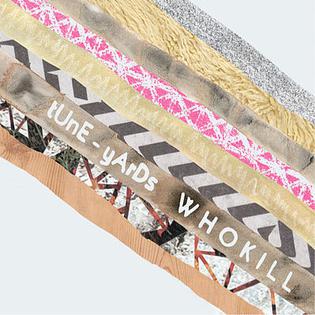Based purely on outward appearances, Tune-yards is a "band" that gave me pause at first. The day-glow face paint and hipster haircuts almost sent me running for the hills. But thankfully my mama taught me not to judge books by their covers or musicians by their haircuts, because musically this band delivers some pretty interesting material.
Whokill is the second full-length album by Tune-yards (and no I refuse to use the stylized tUnE-yArDs or W H O K I L L throughout this post). The "band" is essentially a Merrill Garbus solo project with some backing musicians to fill out the sound. Garbus herself plays the ukulele, creates live drum-loops and sings. On Whokill she also enlists the help of a bassist, guitarist and saxophone section.
What stood out about this album to me was its completely unique sonic profile. There really isn't a band out there that sounds quite like this. There are a few recognizable influences (funk, jazz fusion and afro-beat to name a few) but none that really come to the forefront as a dominating influence. And yet Tune-yards isn't genreless in the way that so many other groups are, by piecemealing different styles together into some sort of Frankenstein creation. This album is something of a novelty in modern music, a sound that is actually new. There's a freshness here that makes me wonder (and hope) if what I'm hearing is a taste of what is to come in rock and pop. It's the same kind of feeling I got when I first heard TV on the Radio.
Disjointed and chaotic are two words that immediately came to mind when I first listened to Whokill. Part of that is Garbus' loop-based compositional style, but another huge factor is her completely otherwordly voice. She is constantly playing vocal gymnastics, leaping from a surprisingly deep growl to a high thin falsetto within the space of one syllable. The production quality is also outstanding on all of the songs here, which works in spite of the distinctly lo-fi charm of her first album. Perhaps die-hard Tune-yard fans will think this album is too polished, but I think the added production quality shows off Garbus' ear for arranging and makes the band sound much larger than it really is.
But it must be noted that Garbus' sound really only works the way it should when she lets you have it full-force. The week points on this album are without a doubt the more downtempo quiet moments like "Wooly Wolly Gong" where she begins to sound too much like a typical singer-songwriter, a guise that doesn't fit her as well as it should. Tune-yards only really seem to hit their stride when the music kicks into higher gear on tracks like the opener "My Country," the tongue and cheek toughness of "Gangster" or the lead single "Bizness." In general though, when Garbus lets her songs rock a little bit harder, her unique songwriting comes out more and creates some pretty exciting music.
Below is the video for "Bizness" which cranks up the hipster something fearce, but is worth sitting through for the music.
Showing posts with label Reviews. Show all posts
Showing posts with label Reviews. Show all posts
Tuesday, May 3, 2011
Monday, April 4, 2011
Review: Lupe Fiasco - Lasers
Lasers, the third outing by backpack rap sensation Lupe Fiasco, is an album that almost wasn't. Fans have been waiting for a follow up to the concept album The Cool since it came out in 2007. Initially, Lupe Fiasco announced that his third (and supposedly final) album would be a three disc release called LupE.N.D. which has since been delayed indefinitely. From there, the album went through several name changes, from the Great American Rap Album, to We Are Lasers, to simply Lasers (in case it isn't readily apparent from these titles, Lupe has never been one for being understated, his concept for the Cool is only further evidence of this,) But the roller coaster ride was far from over. Despite the fact that it had a release date of late 2009 and several singles had been released (some of which never actually did make it onto the album) Lasers didn't actually get released until last month. According to Lupe himself, the album had actually been complete for some time, but was being held up by Atlantic Records. But after several years of waiting, and an online petition to Atlantic to release the record that quickly received 30,000 signatures, Lasers finally hit the shelves. Unfortunately, the head scratching didn't stop there.
For all the anticipation and hype leading up to its release, the actual album turned out to be every bit as confusing and difficult to pin down. Critical response seems to be a resounding "meh," and I can't say I disagree very much. There has been a considerable degree of rumbling in critical circles about the increasing pop sentiment on this album. The Allmusic reviewer, for example, complained of the album's "lumbering, overwrought choruses." While there certainly are some disappointments here that likely arise from the concessions Lupe had to make to finally get this album released, I for one think that to call the hooks and choruses in Lasers a departure is largely ignorant of what Lupe has always done in his music. Lupe's shtick has always been superb rhymes interspersed with hooks painted in broad strokes. Just look at the two most well-known tracks off his debut, "Daydreamin'" and "Kick, Push." Neither of these is devoid of pop overtones. The Jill Scott chorus from "Daydreamin'" is positively infectious, and the strings sampled from Celeste Legaspi's "Bolero Medley" on "Kick, Push" give the song a syrupy grandeur for which any pop composer should be envious.
While the poppier side of Lasers shouldn't be seen as a complete betrayal, there is no denying that the album has its share of disappointments. To my ears, there are two important things missing from this album. The first is trajectory. While the album starts with some strong tracks, particularly the musical indictment of Obama "Words I Never Said," what follows is a sharp decline in quality. The first signs of trouble come on the song "the Show Goes On," which strangles the life out of a sample of Modest Mouse's "Float On." That Lupe would look to the indie rock darlings for inspiration is interesting, but the execution leaves a lot to be desired. Easily the best track on the album, "All Black Everything," comes as the penultimate track on the album. The song imagines a comically absurd alternate reality in which racism doesn't exist. In this world, things are completely turned on their head, Bill O'Reilly eulogizes Malcom X (who dies as an old man) by reading from the Qur'an. Lines like "Somalia is a great place to relax in/ Fred Astaire was the first to do a backspin/ The Rat Pack was cool group of black men" illustrate the kind of lyrical brilliance Lupe is capable of. Any sense of trajectory gained here, however, is completely lost on the album ending "Never Forget You" which features John Legend who completely overshadows Lupe in the worst way possible.
But perhaps even more conspicuously absent from this album is any sense of the quirky nerd-friendly side of Lupe that made him a critical success in the first place. Gone are the geeky rhymes about robots, skateboarding and Japanese culture from Food & Liquor or the grand (if silly) prog-rap sensibility of the Cool. What we are left with is a relatively ordinary hip-hop album from an artist whose appeal is based largely on his ability to be anything but ordinary.
The few bright moments on Lasers make it worth at least a listen, but to see Lupe Fiasco in his more consistent, less adulterated form, first-time listeners should stick to his first two albums.
Friday, September 19, 2008
The Agony of Laffitte

Spoon
"The Agony of Laffitte"/"Laffitte Don't Fail me Now."
For a brief period of time in the 90's, indie rock had its moment in the spotlight. Bands like Nirvana had proven that the right underground music act could flirt with legitimate mainstream success. Major label's were quick to gobble up bands they were convinced would be the "next big thing." The problem was, not every band can write a Nevermind.
Spoon were one of the bands swept up in the madness. In 1998 they were signed to Elektra by a man named Ron Laffitte. The members of Spoon were smart enough to be wary of the deal, knowing what could happen to up and coming artists signed to major record labels if things didn't go right. But Laffitte reassured the band that they wouldn't simply be forgotten by Elektra. He promised them that their new record A Series of Sneaks would get the promotional funding it so desperately needed to stay alive in a mainstream market.
The money, of course, never came. Unsurprisingly, the record sales didn't live up to Elektra's expectations, Lafitte was fired and Spoon was dropped from the label a mere three months after A Series of Sneaks was released. The band responded by releasing the single "The Agony of Laffitte" and its b-side "Laffitte Don't Fail me Now" on Saddle Creek records. The record took aim at both Laffitte and Elektra CEO Sylvia Rhone.
What's great about the single is not that it's an indictment of the music industry, nor that it's a record about the perils of being on a major label, that's been done before by bands full of vitriol (see the Clash's "Capital Radio" EP or "Complete Control"). What's great about Spoon's tale of woe is how non specific they made it sound. Despite the fact that both Laffitte and Rhone are mentioned by name, there's only the slightest of hints as to what is being lamented. A casual listening to either track without any background knowledge would lead you to believe that lines like "and keep telling yourself there's more to you than her/
but you're no better than Sylvia" are about the betrayal of a lover, not a Chief Executive Officer. In fact, the only reason I know the story behind these two songs at all is because I came across an old Village Voice article by Camden Joy called "Total Systems Failure." The article, like anything Joy has ever written, is well worth reading.
What Spoon manage to pull off on "The Agony of Laffitte" is nothing short of amazing. The musical equivalent to a punch in the gut so convincing that even Laffitte and Rhone would be embarrassed were they ever to hear it. All this done with nary a "fuck you" uttered, at least not verbally. But the feeling of betrayal and anger is all there in the lead singer's voice, a sentiment not screamed or even growled, but hissed, almost whispered.
It's like I knew two of you man
the one before and after we shook hands.
But the act of betrayal is never described, there's no need for it to be rehashed. The accused know exactly where they stand. All that remains is for Spoon to ask the pointed question:
All that I, I want to know
Are you ever honest with anyone?
And I say, no no
Are you honest with anyone?
How does it feel to go home
And not be honest with anyone?
What results is an emotionally wrought gut check for anyone who hears it. Its simply one of the most damning songs of betrayal ever put on wax.
Tuesday, August 12, 2008
Beck - Modern Guilt

Beck
Modern Guilt
I've had a few weeks now to digest the new Danger Mouse produced Beck album, and after letting things ruminate a bit I think the album has grown on me. The standard boilerplate response to any new Beck album usually states something to effect that it is unique and innovative but pales in comparison to earlier efforts like Odelay or Mellow Gold.
Well I'm here to call bullshit on that nonsense. As blasphemous as it might sound (I promise to tear up my hipster club card as soon as I finish writing this) I honestly believe that Beck has been matured greatly over the years since Odelay and has become a better songwriter. This is not to say that I think any of his last three albums are necessarily superior to his early work, Beck's "mature songwriter" hat didn't fit him overnight, but it seems clear to me that he has come more into his own now than he had when "Loser" first hit on MTV.
What made Odelay and Mellow Gold so popular was not mature and thoughtful songwriting but a highly developed sense of the absurd and novel. Here was a nerdy white scientologist rapping over delta blues beats with the kind of cockeyed exuberance only a younger Beck could possibly pull off. The novelty of it all could not be denied and it was all very catchy to boot (I still know nearly every ridiculous line of "Loser" by heart). But simply by virtue of his fast growing popularity, Beck knew that he couldn't possibly write five or ten more albums worth of "Where It's At" caliber radio hits and stay relevant.
So the mature songwriter Beck killed the younger funnier Beck, but what he brought with him was a more fully developed sense of melody. Nowhere is this more clear than the haunting "Chemtrails" from the new album. The high breathy vocals display the best thought out melodic arc Beck has ever written. Just like with the previous two albums Guero and the Information, nothing here rocks as hard as a track from the canonized Beck albums. Instead, Beck opts to intersperse soft flowing melodies with driving funk and hip-hop beats. He also seems to have learned from Guero and the Information that if all the slow songs were at the end of the album, the album would seem to drag on and be too front-heavy. Modern Guilt instead alternates between slower and faster songs and seems to end quite quickly.
It's impossible to overlook the amazing production by Danger Mouse. The midas touch of the brilliant producer is in top form here with his trademark dreamy echoes and soul/r&b flourishes. The more I hear from Danger Mouse, the more excited I get to hear who he chooses to work with next. Perhaps Beck and Danger Mouse on the same album is more star power than one could possibly hope for, but I still can't help but imagine the awesomeness that would be a Danger Mouse / Jack White collaboration.
If only we could be so lucky.
Subscribe to:
Posts (Atom)





